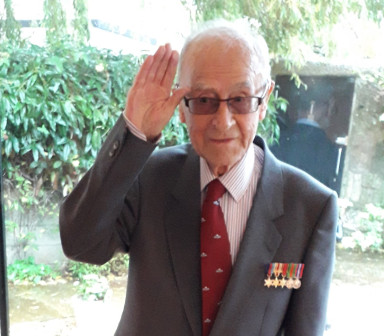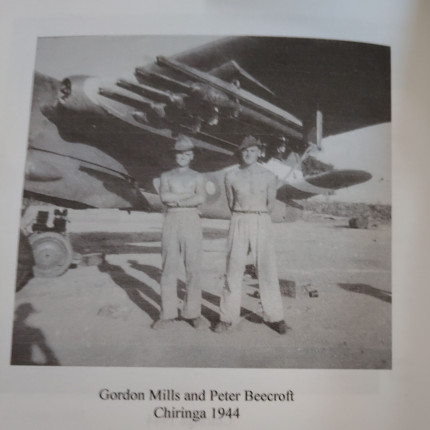As we commemorate VJ Day in 2025 and the end of the Second World War, we are honoured to share here the first of the late Gordon Mills stories, titled 'From Desert to Jungle'.

Gordon, who passed away in 2021 at the age of 99, was a proud veteran who served in Burma during the war. In later life, he became a regular at Sight Scotland Veterans’ Linburn Centre, which he loved! From gliding and skiing to archery and 4x4 driving, Gordon threw himself into every activity often with his wife by his side, camera in hand.
Recently, Gordon’s wife, Yvonne, found stories Gordon wrote recalling his time in Burma and his travels home after VJ Day.
We are honoured to share Gordon’s recollections, 'From Desert to Jungle', below, in both written and accessible spoken audio formats, as both a tribute to his service and a celebration of his life.
From Desert to Jungle
It was some time in August 1944 when Charlie French and I joined the good ship the SS Sontay bound for Bombay and, thereafter, where we were directed by the RTO (Regimental Travel Office).
The war in North Africa was over. We were surplus to requirements and although we did not know it at the time – were on our way to another war in Burma.
Many weeks later we arrived in the Arakan – east of the Brahmaputra and where the Japanese army was fighting its way into India which appeared to be wide open to the tourists from Nippon. Indeed they did break through at several points. As usual the PBI (poor bloody infantry) stood up to the frenzied Japanese onslaught at Imphal and Kohima. It was a period of vicious hand-to-hand fighting, with the dead of both sides piled up. There was no time to remove them. It was warfare at its most horrific. Eventually the savage men from Nippon were stopped and began to retreat.
When Charlie and I arrived at Chiringa dirty, weary and hungry, we were not too happy to be given a spade and told where to dig our trench, as, we were told, “the Japs are just round the corner”. However, we were eventually fed and driven to the armourers’ basha (a large bamboo hut).
Later that day we were given a bed-space and introduced to the other armourers. Dick – a lawyer from London; Peter – another member of the legal fraternity also from London; Joe – we were told had been (before he decided to join the fray) the youngest headmaster in Durham; Jock – the only other Scot in the squadron and a member of a well-known Clydesdale horse breeding family. Jock had often taken horses to South America. Then there was Les who worked in the Cotton Exchange in a northern English town and, of course, Charlie who was a coach body builder from Dagenham. His main preoccupation was mathematics – Charlie was a wizard with numbers. Then there were others with other talents. The armament section of our squadron was, without any doubt, the intellectual hub of the squadron.

In our time off between loading 60 pound high explosive rockets, re-arming the Hispano cannons with high explosive, incendiary and armour piercing 20 mm shells, and Browning guns with .303 ammo, we were at one time or another discussing religion, politics, British and world history and philosophy. We touched on all the sciences including social which, of course, is not a science. The three estates, the fourth dimension and the one God were all open to discussion and argument.
We took our politicians apart, including our great war leader, Winston S Churchill. We knew (we held a mock election to prove it) that Labour would win the first post-war election.
Peter carried a rusting, mildewed, but still working, wind-up gramophone, all over Burma. Such was his love of classical music. Dick and Jock were also classical music buffs. Jock could, and did, silence any interruption with a glower when a record was playing.
Anyone, even from other units, was welcome to interrupt and take part in any discussion, so long as they had something useful to say.
To me and to others like me, it was like being a student in this truly open college of learning, and when the war was all but over, one of the pilots George Hook offered French lessons, and put on plays.
Those young men did a lot for me. I owe them much for the stimulation learning gives to those willing to listen. I will be in their debt forever – my teachers in the University of Chiringa – east of the Brahmaputra.
Very soon after the war against Japan ended, when Hirohito “The Son of Heaven”, Emperor of Nippon and war criminal was proclaiming his innocence to the war crimes investigators, our squadron was disbanded and the majestic bamboo portico of the University of Chiringa – east of the Brahmaputra was abandoned forever, and the aircrews and Beaufighters disappeared. We, like a lost tribe, wandered about eastern India, stopping a while at exotic places on the way – Golunda, Chandpur, Visagapatam, Trichinopoly, Tanjore, Madras and other places with long forgotten names.
I was, at that time (1945), twenty three and had been in the RAF for four years – three of them in war zones – in the deserts of North Africa and the jungles of South East Asia, and was naturally longing for home.
Eventually space was found aboard the one-time luxury liner “Georgic”. No gun crew duties on this voyage. The war was over and at last we were on our way home.
Written by Gordon Mills, 1944